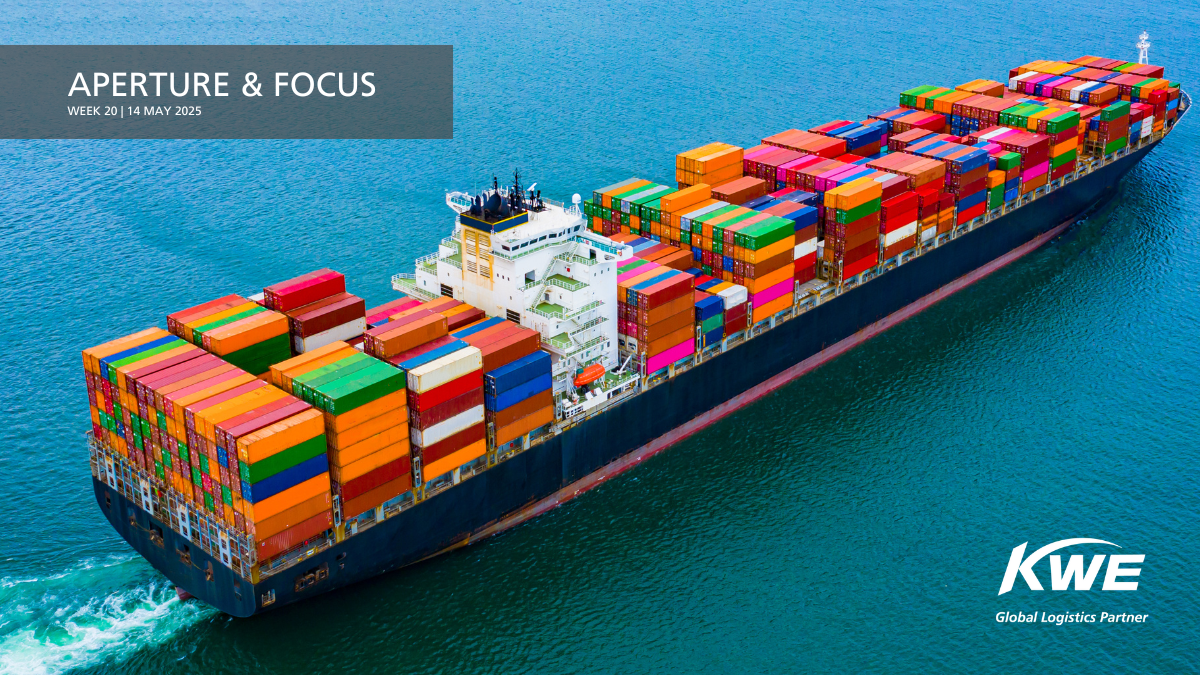Quote
Aperture & Focus 2025: Week 20

Global Aperture
Air cargo volumes from Asia to the United States declined 7% year-over-year in April 2025, according to the latest data from Xeneta. The decline follows months of elevated activity as companies rushed to beat tariff deadlines. Supply chain operators are adjusting forecasts and capacity in response to the softening market, with some warning of further volatility if trade tensions escalate.
Ocean carriers are welcoming a 90-day reduction of tariffs between China and the U.S., but supply chain experts warn that the temporary reprieve may strain logistics networks if demand surges. Importers and exporters are scrambling to adjust routing, inventory, and booking strategies amid tight vessel schedules and limited flexibility.
The Suez Canal will offer a 15% discount on transit fees for large container ships starting May 15th for 90 days, aiming to revive trade and ease rising insurance costs amid improved security conditions. The move follows a steep revenue drop due to Houthi attacks in the Red Sea and a U.S.–Houthi ceasefire brokered by Oman that excludes Israel.
Regional Focus
Americas
United States: The U.S. and China have agreed to temporarily slash tariffs—dropping U.S. duties on Chinese imports to 30% and China’s duties on U.S. goods to 10%—as part of a three-month truce aimed at easing trade tensions and paving the way for further negotiations. While markets rallied on the news, officials warned that key issues like national security and trade imbalances remain unresolved, though the truce could be extended if meaningful progress is made.
As part of the agreement, the U.S. will reduce the "de minimis" tariff on low-value Chinese imports from 120% to 54%, providing temporary relief to e-commerce businesses. However, experts warn that the period of low-cost small package delivery from China to the U.S. may be coming to an end. Rising trade risks and stricter regulations are causing many e-commerce companies to reassess their dependence on the U.S. market, with some looking to diversify their customer bases or shift focus to other regions.
Asia-Pacific
Trade growth in the Asia-Pacific region is under pressure, according to the Association of Asia Pacific Airlines (AAPA), as aircraft delivery delays—now expected to last into 2026—limit available air cargo capacity. Airlines are unable to scale fleets as planned due to manufacturing and supply chain constraints, raising concerns about space shortages during the 2025 peak season.
China: The end of the U.S. de minimis exemption—which had allowed packages valued under $800 from China to enter duty-free—has led to a sharp drop in transpacific air cargo, with freighter capacity down 40% and nearly 50 large freighters grounded. Since the policy change took effect on February 4th, 2025, the number of transpacific freighter flights arriving at major U.S. airports has fallen by 30%. As of May 8th, 2025, air cargo shipments from Asia to the U.S. are down 20% to 30% year-over-year compared to May 2024. While some capacity has shifted to the North-South America trade for seasonal demand, most carriers are opting to fly less as rates and volumes from China to the U.S. continue to fall.
India: India's largest ports, Kandla and Mundra, resumed operations on May 9th after a temporary shutdown due to heightened security concerns amid rising tensions with Pakistan. To address potential threats and ensure safety, the Directorate General of Shipping has raised maritime security to MARSEC Level 2 for all Indian ports, terminals, and vessels, effective immediately, as operations continue.
Europe, Middle East & Africa
South Africa: South Africa’s main transport union, the United National Transport Union (UNTU), will continue wage talks with state-owned Transnet on May 14th–15th after rejecting a multi-year pay offer and demanding a 10% raise. A strike could disrupt key export infrastructure and further strain an economy that has averaged less than 1% growth over the past decade.
United Kingdom: Starting 1st July, the United Kingdom will implement new border checks on “medium-risk” fruit and vegetable imports to enhance biosecurity, but industry leaders warn of major delays and cost increases due to lack of government preparedness. Stakeholders, including Seafrigo and the Fresh Produce Consortium, say the Department for Environment, Food and Rural Affairs (DEFRA) has failed to address critical issues, raising fears of supply chain disruption and a spike in food prices.